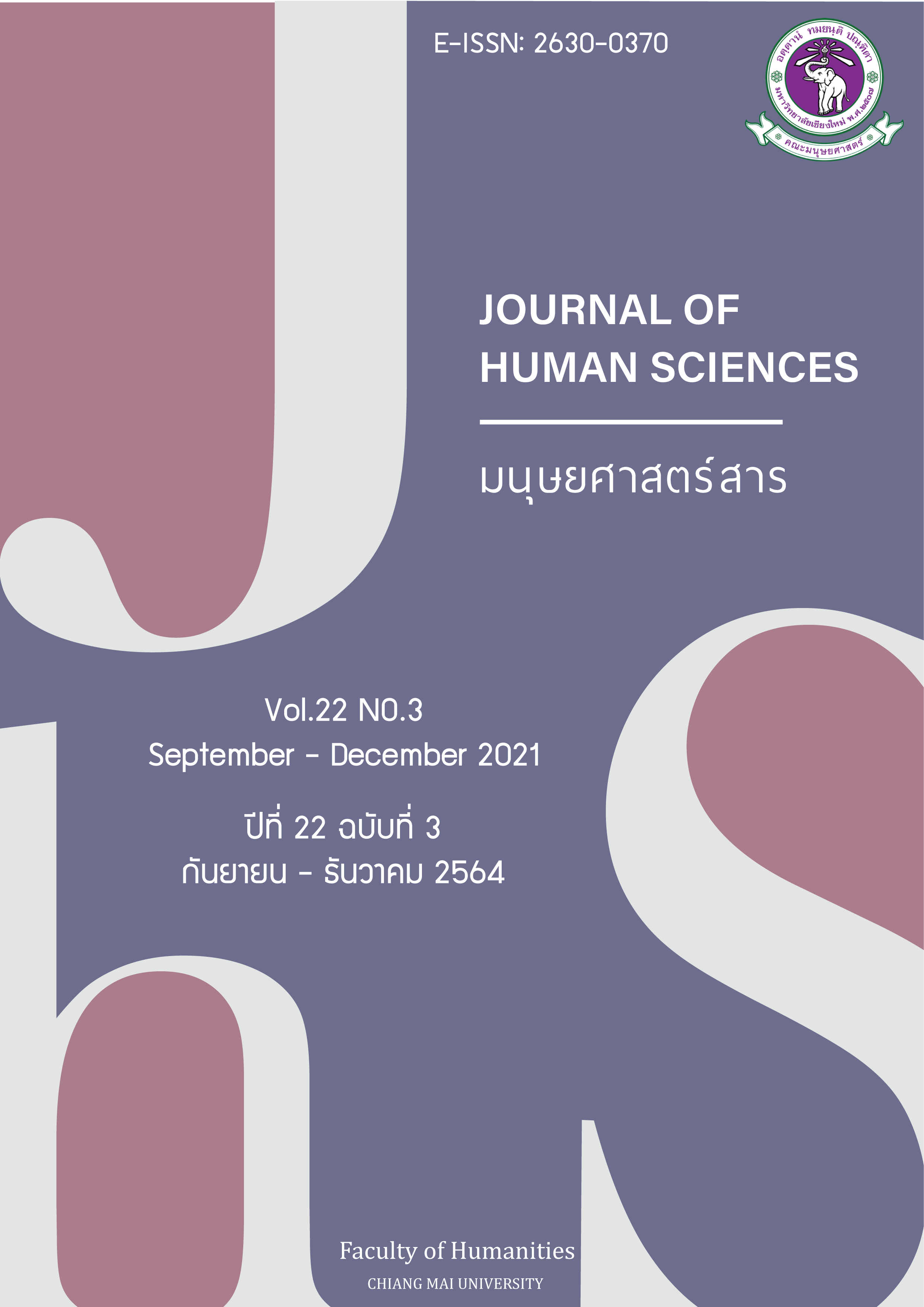สหายใต้เงามาร์กซ์ ฟรีดริช เองเกลส์ กับสภาพของชนชั้นแรงงานในอังกฤษ
Main Article Content
บทคัดย่อ
แม้ว่ามิตรภาพระหว่างคาร์ล มาร์กซ์และฟรีดริช เองเกลส์ จะเป็นหนึ่งในมิตรภาพที่โด่งดังที่สุดในหมู่นักคิดและนักปฏิวัติคนสำคัญในประวัติศาสตร์ มิตรภาพที่ว่านี้มักจะได้รับการตีความจากผู้ที่ศึกษานักคิดทั้งสองคนหรือกระทั่งตัวเองเกลส์เองว่า มันเป็นความสัมพันธ์ที่ตั้งอยู่บนความไม่เท่าเทียม ในขณะที่มาร์กซ์ได้รับการสรรเสริญว่าเป็นนักปรัชญาผู้ยิ่งใหญ่ นักคิดระดับยักษ์ใหญ่ และนักเขียนสายวิพากษ์ เองเกลส์มักจะถูกมองว่า เขาเป็นเพียงผู้ช่วยเหลือมาร์กซ์ในเรื่องส่วนตัว ผู้ช่วยมาร์กซ์ประพันธ์งานเขียน นักเขียนที่ไม่มีความริเริ่มสร้างสรรค์ผู้ซึ่งทำหน้าที่เพียงแค่เผยแพร่ความคิดของมาร์กซ์ หรือกระทั่งผู้สมาทานแนวคิดมาร์กซิสต์คนแรกที่ทำการบิดเบือนทฤษฎีของมาร์กซ์ บทความชิ้นนี้ทำการท้าทายความเข้าใจดังกล่าวด้วยการแนะนำให้ผู้อ่านได้รู้จักกับ The Condition of the Working Class in England นี่คืองานระดับขึ้นหิ้งของเองเกลส์ที่ประพันธ์ขึ้นมาตอนที่มิตรภาพระหว่างเขากับมาร์กซ์เพิ่งจะก่อตัว และมันยังเป็นงานที่ส่งอิทธิพลต่อมาร์กซ์เป็นอย่างมาร์กซ์ในการศึกษาระบบทุนนิยม ไม่เพียงเท่านั้น หนังสือเล่มนี้คือผลงานชิ้นเอกของเองเกลส์ที่แสดงให้เห็นคุณูปการอันยิ่งใหญ่ของเขาที่มีต่อทฤษฎีมาร์กซิสต์ การศึกษาแนววิพากษ์ในวิชาเศรษฐกิจการเมือง สังคมศาสตร์ และประวัติศาสตร์ รวมถึงการถกเถียงปัญหาที่ยังดำรงอยู่ในสังคมทุนนิยมร่วมสมัย ในแง่นี้ เองเกลส์จึงไม่ควรที่จะถูกมองว่าเป็นเพียงแค่ผู้รับบท “พระรอง” ให้กับมาร์กซ์อย่างที่มักจะเข้าใจกันอีกต่อไป หากแต่เขาควรจะได้รับการรำลึกและสดุดีในฐานะนักคิดที่ยิ่งใหญ่ด้วยตัวของเขาเอง
Article Details

อนุญาตภายใต้เงื่อนไข Creative Commons Attribution-NonCommercial-NoDerivatives 4.0 International License.
เอกสารอ้างอิง
Blackledge, P. (2020, May 1). Engels vs. Marx?: Two hundred years of Frederick Engels. Monthly Review. https://monthlyreview.org/2020/05/01/engels-vs-marx-two-hundred-years-of-frederick-engels/
Boyer, G. (1998). The historical background of the communist manifesto. Journal of Economic Perspectives, 12(4), 151-174.
Carver, T. (1981). Engels. Oxford: Oxford University Press.
Carver, T. (1983). Marx and Engels: The intellectual relationship. Bloomington: Indiana University Press.
Carver, T. (1990). Friedrich Engels: His life and thought. London: Palgrave Macmillan.
Clark, B. & Foster, J. B. (2006). The environmental condition of the working class. Organization & Environment, 19(3), 375-388.
Engels, F. ([1880] 1975). Latthi sangkhomniyom baep phoefan lae baep witthayasat [Socialism: Utopian and scientific] (Uthit & Yothin, Trans.). Bangkok: Pho Sam Ton Kan Phim. [in Thai].
Engels, F. ([1876] 1984). Botbat khong raengngan nai kan plian ling hai pen khon [The part played by labour in the transition from ape to man] (T. Aphiwat, Trans.). Marxists Internet Archive. Retrieved January 25, 2021, from https://www.marxists.org/thai/archive/marx-engels/1876/ape-to-man/index.htm [in Thai]
Engels, F. ([1843] 2010a). Outlines of a critique of political economy. In Marx & Engels Collected Works, volume 3 (pp. 418-443). London: Lawrence & Wishart.
Engels, F. ([1844] 2010b). Engels to Marx, November 19, 1844. In Marx & Engels Collected Works, volume 38 (pp. 9-14). London: Lawrence & Wishart.
Engels, F. ([1845] 2010c). To the working-classes of Great Britain. In Marx & Engels Collected Works, volume 4 (pp. 297-301). London: Lawrence & Wishart.
Engels, F. ([1845] 2010d). The condition of the working class in England. Cambridge: Cambridge University Press.
Engels, F. ([1869] 2010e). Karl Marx. In Marx & Engels Collected Works, volume 21 (pp. 59-64). London: Lawrence & Wishart.
Engels, F. ([1883] 2010f). Ludwig Feuerbach and the end of classical German philosophy. In Marx & Engels Collected Works, volume 26 (pp. 353-398). London: Lawrence & Wishart.
Engels, F. ([1884] 2010g). Engels To Johann Philipp Becker in Geneva, October 5, 1884. In Marx & Engels Collected Works, volume 47 (pp. 201-203). London: Lawrence & Wishart.
“Friedrich Engels’ 200th birth anniversary-the ‘second fiddle’ who shines on.” (2020, November 26). Xinhua. http://www.xinhuanet.com/english/2020-11/26/c_139545024.htm
Henderson, W. O. (1976). The life of Friedrich Engels. London: Routledge.
Henderson, W. O. (1989). Marx and Engels and the English workers and other essays. London: Routledge.
Himmelfarb, G. (1983). Engels in Manchester: Inventing the proletariat. The American Scholar,
(4), 479-496.
Hobsbawm, E. ([1969] 2011). On Engels’ The condition of the working class in England. In How to change the world: Reflection on Marx and Marxism (pp. 89-100). New Haven: Yale University Press.
Hodges, D. (1965). Engels’s contribution to Marxism. Socialist Register, 2, 297-310.
Hollander, S. (2011). Friedrich Engels and Marxian Political Economy. Cambridge: Cambridge University Press.
Holloway, J. (2002). “The tradition of scientific Marxism.” Marxists Internet Archive. Retrieved April 25, 2020, from https://www.marxists.org/subject/marxmyths/john-holloway/article.htm
Hunley, J. D. (1991). The life and thought of Friedrich Engels: A reinterpretation. New Haven: Yale University Press.
Hunt, T. (2009). Marx’s general: The revolutionary life of Friedrich Engels. New York: Metropolitan Books.
Johnson, P. ([1988] 2007). Intellectuals: From Marx and Tolstoy to Sartre and Chomsky. New York: HarperCollins.
Jordan, Z. A. (1967). “The origins of dialectical materialism.” Marxists Internet Archive. Retrieved April 28, 2020, from https://www.marxists.org/subject/marxmyths/jordan/article.htm
Katznelson, I. (1992). Marxism and the city. Oxford: Clarendon Press.
Lenin, V. I. (1896). “Frederick Engels.” Marxists Internet Archive. Retrieved January 20, 2021, from https://www.marxists.org/archive/lenin/works/1895/misc/engels-bio.htm
Levine, N. (1973). Marxism and Engelsism: Two differing views of history. Journal of the History of the Behavioural Sciences, 9(3), 217-239.
Levine, N. (1975). The tragic deception: Marx contra Engels. Oxford: Clio Books.
Magubane, B. (1985). Engels: The condition of the working class in England in 1844 and the housing question (1872) revisited; Their relevance for urban anthropology. Dialectical Anthropology, 10, 43-68.
Marcus, S. ([1974] 2017). Engels, Manchester, and the working class. London: Routledge.
Marx, K. ([1867] 1992). Capital, volume I. (B. Fowkes, Trans.). London: Penguin.
Marx, K. ([1885] 1993a). Capital, volume II. (D. Fernbach, Trans.). London: Penguin.
Marx, K. ([1894] 1993b). Capital, volume III. (D. Fernbach, Trans.). London: Penguin.
Marx, K. ([1863] 2010a). Marx to Engels, April 9, 1963. In Marx & Engels Collected Works, volume 41 (pp. 466-469). London: Lawrence & Wishart.
Marx, K. ([1859] 2010b). Preface to A critique of political economy. In Marx & Engels Collected Works, volume 29 (pp. 269-265). London: Lawrence & Wishart.
Marx, K., & Engels, F. ([1844] 2010a). The holy family. In Marx & Engels Collected Works, volume 4 (pp. 5-211). London: Lawrence & Wishart.
Marx, K., & Engels, F. ([1845] 2010b). The German ideology. In Marx & Engels Collected Works, volume 5 (pp. 15-539). London: Lawrence & Wishart.
Marx, K., & Engels, F. ([1848] 2010c). The communist manifesto. In Marx & Engels Collected Works, volume 6 (pp. 477-519). London: Lawrence & Wishart.
Marx, K., & Engels, F. ([1848] 2010d). Thalaengkan phak khommionit [The communist manifesto]. Bangkok: Fai Lam Thung. [in Thai].
McLellan, D. (2009). Introduction to The condition of the working class in England, by F. Engels (pp. ix-xx). Oxford: Oxford University Press.
Musto, M. (2020, November 28). Friedrich Engels was more than second fiddle to Karl Marx. Jacobin. https://www.jacobinmag.com/2020/11/friedrich-engels-karl-marx-relationship
Rubel, M. (1972). “The legend of Marx, or ‘Engels the founder.’” Marxists Internet Archive. Retrieved April 28, 2020, from https://www.marxists.org/subject/marxmyths/maximilien-rubel/article.htm.
Russell, M. (2004). The condition of the working class in England. Journal of Health Service and Policy, 9(3), 184-185.
Sewell, R. (2020, November 27). Engels at 200: A giant of Marxism. Socialist Appeal. https://www.socialist.net/engels-at-200-a-giant-of-marxism.htm
Saipradit, K. (1981). Kamnoet khropkhrua rabiap sangkhom khong manut [The origin of the family and the order of human society]. Bangkok: Kho Pai. [in Thai].
Sivaraksa, S. ([1992] 2020). Lokkhrap panyachon farang [Unmasking western intellectuals]. Bangkok: Kled Thai. [in Thai].
“The revolutionary socialist: 200 years of Friedrich Engels.” (2020, November 27). DW.com. https://www.dw.com/en/the-revolutionary-socialist-200-years-of-friedrich-engels/a-55718299
Thomas, P. (1976). Marx and science. Political Studies 24(1), 1-23.


